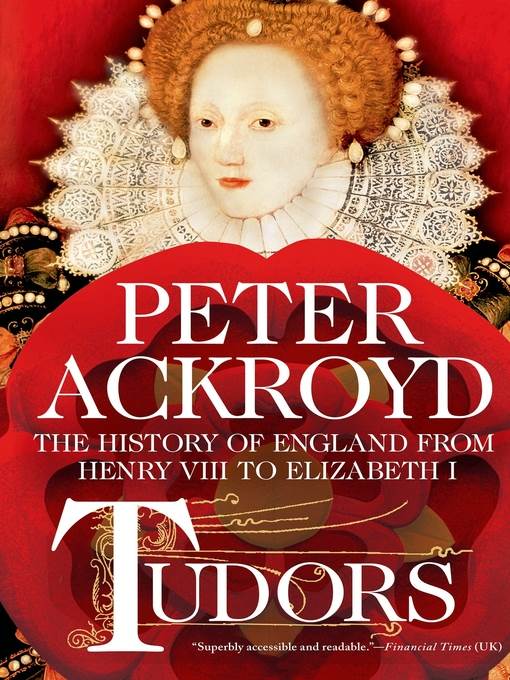
Tudors--The History of England from Henry VIII to Elizabeth I
The History of England Series, Book 2
کتاب های مرتبط
- اطلاعات
- نقد و بررسی
- دیدگاه کاربران
نقد و بررسی

August 5, 2013
The theme of novelist and historian Ackroyd’s second title in his projected six-volume history of England (after Foundation) is the 16th-century religious reformation that began, as a dynastic matter, with Henry VIII’s divorce from Katherine of Aragon in 1533. While there was neither an Inquisition in England as in Spain, nor the wholesale slaughter of citizens as in France’s 1572 St. Bartholomew’s Day Massacre, the Reformation in England was marked by upheaval and bloodshed, as the Tudors imposed religious changes upon an initially reluctant populace. Henry VIII, for instance, dealt harshly with critics, ordering the executions of “a good number of the inhabitants of every town, village and hamlet” that dared join a 1536 popular revolt against the new order. And, while 300 English “heretics” were burned at the stake during Mary I’s four-year reign, earning her the nickname, “Bloody Mary,” Ackroyd points out that 200 Catholics were executed during Elizabeth I’s 45-year reign. While the author focuses on the politics of religious change, this is an accessible account, made even more so by anecdotes revealing the personalities of the main characters (e.g., Henry VIII became so obese that his bed had to be enlarged to a width of seven feet, and Mary Stuart wore crimson underclothes at her execution in 1587).

September 1, 2013
Prolific British novelist, biographer and critic Ackroyd launches the second volume of his sweeping history less than two years after beginning with Foundation (2012). Readers curious about 16th-century British daily life or culture must look elsewhere; Ackroyd concentrates on Britain's ruling Tudors--minus the first, Henry VII, covered earlier. This installment opens with the 1509 accession of Henry VIII (1491-1547). Few mourned his harsh and rapacious but also unwarlike father, who left a full treasury which Henry soon emptied in wars with France before plunging into the dynastic and religious quarrels that dominated his reign. Obsession with having a male heir, not lust, was responsible for his plethora of wives. No fan of the Protestant Reformation, Henry broke with the papacy over its refusal to grant a divorce from his first wife. Once he had destroyed papal authority and looted its property, he disappointed reformers by largely preserving Catholic credos such as priestly celibacy and transubstantiation. His death and the accession of 9-year-old Edward saw the Anglican Church's transformation into a recognizably Protestant body, which his Catholic sister and successor, Mary, could not reverse in a stormy five-year reign. By this point, readers may be wearying of interminable, fierce and bloody religious controversy, a feeling Elizabeth shared. But religion obsessed 16th-century Britons, so her efforts to cool matters were only partly successful, but she proved a prudent, less bloodthirsty ruler and the most admirable Tudor. As usual, Ackroyd is a fine guide. A solid multivolume popular history: readable, entirely nonrevisionist and preoccupied by politics, religion and monarchs--a worthy rival to Winston Churchill's History of the English Speaking Peoples.
COPYRIGHT(2013) Kirkus Reviews, ALL RIGHTS RESERVED.

Starred review from September 1, 2013
The Tudor era was pivotal in English history and remains of perennial interest to the general reader. Ackroyd takes on this much-written-about family history in his new, highly engaging book. His bona fides as an author to trust and enjoy rest on many well-appreciated nonfiction titles, including London: The Biography (2001), and compelling novels, among them Chatterton (1987), a historical novel about poet Thomas Chatterton (175270). Ackroyd's primary interest here is how the reformation of the English church came about. From the time when Henry VIII's desperation over the lack of a male heir compelled him to set aside his first queen, Catherine of Aragon, to when his second wife Anne Boleyn's daughter, the glorious Elizabeth I, died after a long, complicated reign that nevertheless brought peace to the land, Ackroyd presents in rich prose and careful explanations how the English Reformation was not a movement of the people but a personal project of King Henry, who, Ackroyd insists, remained, despite his removal of papal authority over the English church, an orthodox Catholic. Under his immediate heir, the boy-king Edward VI, England veered sharply Protestant, but Edward's elder sister, Mary I, during her brief occupancy of the throne, forced England back to full Catholicism. The genius of the next and last of Henry VIII's children, Elizabeth I, was to establish a middle course between these two extremes.(Reprinted with permission of Booklist, copyright 2013, American Library Association.)

May 1, 2013
Ackroyd, who is responsible for books like London: The Biography, offers the second in his "History of England" series. His skills as a novelist will doubtless come into play as he chronicles the Tudors.
Copyright 2013 Library Journal, LLC Used with permission.

September 15, 2013
The second book of Ackroyd's projected six-volume history of England dives headfirst into its subject matter--with Henry VIII's ascension to the throne. Ackroyd (London: The Biography) covered the roots and earlier years of the Tudor dynasty, including Henry VII's reign, in his previous volume, Foundation. Readers wanting the author's views on the Tudors as a whole should take note. He interweaves his narrative of the Tudor monarchs here with a detailed exploration of the religious reformations and upheavals of the era, sparked by Henry VIII's break with the Roman church and destined to have tremendous and long-lasting effects on English history and culture at all levels. VERDICT A weightier and more focused read than Leanda de Lisle's study, below, this work should be of particular interest to those seeking an in-depth look at the religious changes of the Tudor period and the complex and often violent ways in which religious upheaval intertwined with politics.--Kathleen McCallister, Univ. of South Carolina Libs., Columbia
Copyright 2013 Library Journal, LLC Used with permission.

























دیدگاه کاربران